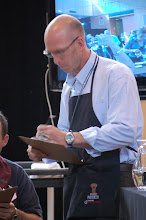Hello again and welcome to my third in what may end up being a long series on manual brew costing. Think of it in the same way you do when one variable in espresso changes, there's several solutions which all work, but one perfect solution which takes several attempts to reach.
From my last post "Manual Brew Costing Part II" I came to the conclusion that Batch Brewing and Manual Brewing are perfect substitutes, ie a normal customer would be just as happy if he received one instead of the other at the same price and time. We can argue all day whether one tastes better than the other, but for the sake of progress, I'm assuming a customer would choose a Manual Brew over Batch Brewing if:
1. They had more time to spend
2. They were willing to pay more for their coffee
3. They were convinced the cost of 1 and 2 was worth it in the cup.
So I will repeat the equation I formed to describe this transaction:
Demand for Coffee = Batch Brewed + Manual Brewed/Higher Price and Wait Time
The denominator of Higher Price and Wait Time reduces the number of Manual Brewed Coffees sold and does not affect Batch Brewed Coffee.
I next concluded because they are perfect substitutes, there exists the possibility of eliminating one and shifting all volume to Manual in order to attempt to achieve labour efficiency. The new equation would look something like this:
Demand for Coffee = Manual Brewed/Price + Wait Time
This is effectively the same sort of equation which would describe any transaction. You could substitute any good into it and it would describe most pretty well. The reality is any espresso bar has many imperfect substitutes in the form of tea, espresso, juice, hot chocolate, cappuccino etc, which all serve to tempt the customer away from Manual Brewing with various degrees of effectiveness. I claimed that eliminating Batch Brewing in my last post could potentially eliminate the drag Price and Wait Time had on the demand, but there are other choices which also serve to tempt the customer. For this reason, the denominator must remain as a drag on Manual Brew Sales.
All coffee shops operate in highly competitive environments, so much so that we often look for any competitive advantage available in order to differentiate ourselves from our nearest competitors. The reality is that coffee is (wait for it) not a necessity, but a luxury good. Stop cringing, I drink way more coffee than most, but it isn't water, diapers or medication.
The degree with which demand fluctuates with price is determined by the Price Elasticity of Demand which is defined by the following equation:
Price Elasticity of Demand = Percentage Change in Quantity Demanded/ Percentage Change in Price
Including this into our Demand equation it becomes:
Demand for Coffee = Manual Brewed Coffee/Wait Time + Batch Brewed Coffee + Price Elasticity of Demand
Since most coffee shops operate in highly competitive environments, one where customers are very aware of your prices and your competitors, we can deduce that the elasticity is relatively high for coffee on an individual level. A high elasticity means in practical terms, that if you raise your prices 10%, you will experience a greater than 10% drop in quantity of sales. If you lower your price by 10%, you will experience a greater than 10% increase in quantity of sales. There does exist factors which can buffer the effects, such as customer brand loyalty, relatively cheap purchase, increased perceived value derived from marketing efforts, captive customers related to store location etc, but generally this relationship of price to volume is pretty sound. Anyone who would argue that the elasticity of demand is neutral is effectively claiming that they can raise their pricing while remaining galvanized against a negative customer reaction, which if it were true, we'd be witnessing $10 cups of coffee on every corner.
I do want to point out that on a macro or market level, demand is relatively inelastic, meaning increases in prices don't appear to negatively effect the whole coffee market. We are currently testing C market prices not seen in over a decade and demand has not waned, perhaps because of the elastic nature of micro choices keeps the prices competitive for the individual.
Finally, if we can agree that coffee is a highly competitive product, and possesses a high elasticity of demand, then the rise in pricing will negatively effect sales volumes at a greater percentage rate than the price increase itself. Further, since Manual Brewing will always incur higher portion costs than Batch brewing, the price should always be higher than Batch Brewed. If the price is higher and the wait time is longer, then the volume will always be less than Batch Brewed even if we completely eliminate Batch Brewed coffee as an option. Instead customers will either seek out alternatives within your shop, or go elsewhere. If the volume is less than Batch Brewed Coffee, then the possibility of achieving labour efficiency is hobbled and Manual Brewing becomes a drag on profitability.
Subscribe to:
Post Comments (Atom)





No comments:
Post a Comment